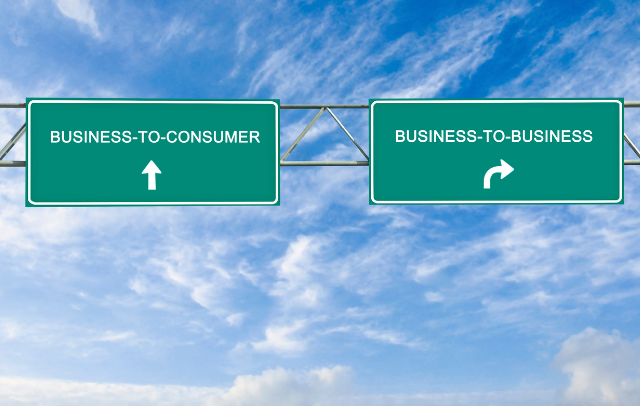5 Key Differences Between B2B & B2C Marketing

There has been an ongoing debate on whether business-to-business (B2B) marketing is an art or science. There is a lingering perception that B2B marketing is boring, and all the creative talent goes to business-to-consumer (B2C) marketing. B2B marketing is expected to be all about data, whereas B2C marketing has all the fun playing around with emotions and experiences.
This debate is much more relevant now as we have access to insightful data that supports the customers’ buying habits, their issues, and their wants and needs – yet where is the human in the data? Data, if interpreted correctly, may tell us what our customers do, but it doesn’t tell us why. Data may inform our marketing activities, but it doesn’t necessarily drive the kind of results marketing must deliver on a sustainable long-term basis. Just think about a marketing strategy that has stood out over the past few years, then think about what has made it stand out? Not the data certainly.
No matter what industry you are speaking to, you are essentially selling to humans, and humans always need something exciting to spark their interest. So, if you come to think of it on a deeper level, there is no B2B or B2C, it’s all human to human (H2H).
Even though for both B2B and B2C, it all begins and ends with people making a purchasing decision, there are some tactical differences in the two approaches and it’s important to recognize these disparities for more streamlined and effective marketing strategies.
1. The Buyer or Decision Maker
If you can segregate your b’s from your c’s, the difference is easy to see. B2B and B2C marketing target completely separate entities- professional and personal.
B2C marketing could focus on:
- A woman buying a tote bag
- A kid who needs the latest phone
- A man with tooth sensitivity looking for a toothpaste
On the other hand, B2B marketing may speak to:
- Companies looking for financial services
- Stores looking for retail technology software
- Cafes looking for sustainable straws
2. Decision Drivers
Businesses and corporations usually take longer to make a purchasing decision. They use logic and reason, and while emotion is a factor, they need to rationalize their purchase to not just themselves, but in many cases, to their team. In comparison, individual customers usually rely less on logic and more on emotion
3. The Chain of decision Making
In most organizations, decisions aren’t taken autonomously. When making purchases for a company, mostly everyone answers to someone else. Marketing has to catch someone’s eye initially, but it also has to appeal at various levels. In contrast, buying a pair of jeans or a new blender requires no committee or authorization form.
4. The Conversion Timeline or Sales Cycle
The time from when someone is introduced to a product or service to when they make a buying decision is crucial as it dictates when the transaction takes place. That time frame is much longer when it comes to B2B versus B2C purchases. Businesses often use long-term planning, which means marketing is used to nurture the target toward a purchase over time and must be persistent and patient.
However, individuals may be ready to buy in a matter of minutes…if the marketing can convince them quickly, that is.
5. The Return on Investment (ROI)
Businesses are more likely to think about the bottom line (initial cost, ROI, ongoing costs, etc.) when it comes to their purchases when compared to individual customers. Your B2B marketing needs to convey that your products/services provide a good return on investment, both now and into the future. If you’re a B2C marketer, you may or may not need to make this as much as a priority B2B marketers would, depending on the cost/investment level of your products/services.
The world of marketing can be complicated. However, when you consider that you’re selling to people in every instance, you can find a way to speak directly to them and convince them that you have just what they’re looking for.
Again, let’s not forget that we are marketing to people, whether in a B2B or B2C context.
At Magnolia, we understand the importance of addressing the needs and challenges of your target audience while implementing a marketing strategy that is right for your brand. Contact us today to enhance your current marketing campaign, we are here to help.
By Harpreeti Naraan, Digital PR / Communications Associate at Magnolia Communications – a B2B demand generation full-service marketing agency headquartered in Vancouver, BC. We focus on engaging, nurturing and converting leads with PR programs, paid social ads, email marketing, and marketing technology implementation.
Read More

The Importance of PR in Wealth Management
The financial services industry has become crowded and competitive over the last decade. Ensuring your brand stands out to potential

Public Relations in the Payments Industry
Using Media and Your Spokespersons to Build Trust and Credibility “The problem is not a loss of money or credit,

Harness the Power of Paid Social Advertising for Your B2B Business (Updated for 2025)
Dive into the heart of innovation as we unfold the captivating narrative of Magnolia’s transformative journey. In this blog, we